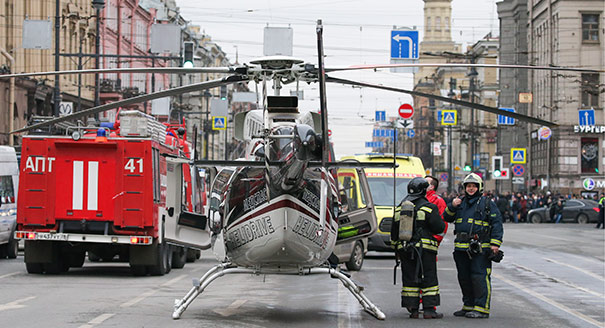We had gotten used to the idea that St. Petersburg was a safe place to live. After all, up until Monday’s bomb explosion on the metro, all similar tragedies had occurred elsewhere: in Moscow, which has always borne the brunt of attacks like this one, in the North Caucasus, or in the Middle East. And of course in Europe, which—or so the Russian media tells us—has lost its instinct of self-preservation and allowed its security situation to slip out of control.
Even the terrorist bomb that destroyed the Russian airliner flying from Sharm el-Sheikh to St. Petersburg in October 2015, killing more than 200 people, was not felt to be an attack on our city but an atrocity that happened far away.
Monday’s killings on the St. Petersburg metro changed all that. We have now been stripped of the illusion that our city is safer than any other European city. We are in a state of shock and must get used to the new reality that has now engulfed us.
It’s obvious that the location of Monday’s terrorist act was not chosen at random. It was timed to coincide with President Vladimir Putin’s visit to his native city and send the message that even the presence of Russia’s head of state did not guarantee the citizens of St. Petersburg extra security.
The terrorist chose one of the most crowded spots on the city’s metro system to detonate his bomb: the tunnel between Sennaya Ploshchad and Tekhnologichesky Institut stations. These are interchange stations between different lines, and the trains between them are packed even late in the evening. In the aftermath of the attack, many people, including this author, immediately said, “I am often traveling that way at just that time.”
The second bomb, disguised as a fire extinguisher, was left in another crowded place in the center of the city familiar to most locals, Ploshchad Vosstaniya metro station.
I won’t comment on the work of the security forces, who were not able to stop one incident, but did prevent another atrocity and more agony by defusing the second shrapnel-filled bomb. Eyewitnesses said that emergency services performed their duties very swiftly and efficiently and did what they could to prevent panic and hold back the gawkers, who unfortunately came to watch the scene.
Fortunately, a far greater number of people dropped what they were doing and turned out to offer whatever help they could. Soon after the explosion, the city’s transport system was paralyzed. First, all the central stations were closed, then the decision was taken to shut down the whole metro system so as to check all the tunnels. Trains started running again only several hours later.
In the meantime, thousands of people were stranded far from home. Passengers were allowed to travel free on all buses, trams, trolleybuses, and suburban trains. Many private drivers picked up people waiting at bus and tram stops and carried them for free. Social media pages filled up with offers of help. People living in the center invited strangers into their homes.
I want to stress another important detail. I observed that the last thing St. Petersburgers were interested in was, “Who is to blame?” You did not hear the question posed either in personal conversations or on social media. No one was inclined to blame the city authorities for not protecting them, even though they are massively unpopular, the security services, or the metro. This may be of course because nowadays everyone believes that “they will never tell us the truth” and therefore does not even ask the question.
The other eternal Russian question, “What is to be done?” is so far only being asked rhetorically. Everyone understands that increased security measures will not guarantee anything. The system already has metal detectors at its 67 stations, but any daily rider will tell you that they can easily be ignored or bypassed, and I have never seen anyone stopped because the machine beeped.
It would be impossible to check people entering the metro as if it were an airport. Try doing that at 8 a.m. at Prospekt Veteranov, which is regarded as the most crowded metro station in the whole of Russia. Imposing new controls at a busy station would only increase the crowds and make for an even more vulnerable target for terrorists.
So it is hard to say what the local reaction will be to increased security measures. The only thing that it is worth noting is that there have been many poorly planned official initiatives imposed on the city in recent years, and any step that is rash or misconceived will be greeted with annoyance and anger.
Shocked and frightened as we were yesterday, most of us still went down into the metro today. Sooner or later, almost everyone will get back to their old schedules and routes, just as citizens of Moscow, London, Brussels, and other cities did following terrorist attacks. Of course there will be suspicion and nervousness and extra vigilance. But the experience of those other cities is that they had to endure this and carry on—and that is something we in St. Petersburg will now have to learn as well.



